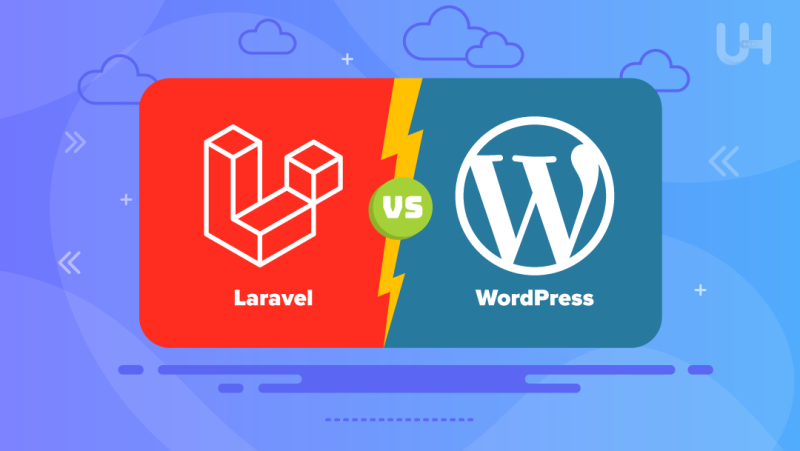When it comes to building websites, picking the right tool is very important. In 2024, two big names in the game are Laravel and WordPress. But which one is better? That’s what we’re here to find out! We’ll break down the pros and cons of each in simple terms, so whether you’re a tech expert or just getting started, you’ll know which one suits your needs best. Let’s start the discussion on Laravel vs WordPress – Which is Better in 2024?
Overview of Laravel and WordPress
In web development, two names stand out: Laravel and WordPress. Each serves as a cornerstone for building websites but in different ways.
Laravel: The PHP Framework
Laravel is not just a tool; it’s a framework that provides developers with a solid structure to create web applications efficiently. Think of it as the blueprint that guides developers in building websites and web applications using PHP, a versatile and widely used programming language. Laravel simplifies common tasks such as routing, authentication, caching, and database management, allowing developers to focus on building unique and feature-rich applications.
WordPress: The Popular CMS Platform
WordPress, on the other hand, is more like a ready-made solution for website building. It’s a content management system (CMS) that empowers users to create and manage stunning websites without diving into the complexities of coding. With its intuitive interface and extensive library of themes and plugins, WordPress is the go-to choice for bloggers, small businesses, and large enterprises alike. WordPress offers a user-friendly platform to bring your ideas to life, whether you want to start a blog, set up an online store, or create a corporate website.
Unlock Your Website’s Potential Today!
Ready to take your web development journey to the next level? Explore Ultahost’s WordPress hosting services and unleash the full power of your website. Get started now!
Comparison of Features
Let’s compare the key features so you can make an informed decision:
Performance and Speed
When it comes to the performance and speed of websites, both Laravel and WordPress have their strengths and weaknesses.
Laravel vs WordPress Performance
Laravel, being a PHP framework with a dedicated server, offers excellent performance due to its efficient codebase and optimization features. It allows developers to write clean and organized code, resulting in faster load times and better overall performance. WordPress, while known for its ease of use and flexibility, may sometimes lag in terms of performance, especially for larger websites with extensive plugins and themes. However, WordPress websites can still achieve impressive speeds with proper optimisation techniques.
Laravel vs WordPress speed
Laravel provides various built-in features and optimizations to enhance website speed, such as route caching, database indexing, and efficient query handling. Developers can also leverage tools like Laravel Mix for asset compilation and optimization. WordPress offers several plugins and optimization techniques to improve website speed, including popular caching plugins like W3 Total Cache and WP Super Cache, image optimization plugins like Smush, and lazy loading of images and scripts. Additionally, using lightweight themes and minimizing the use of unnecessary plugins can further boost WordPress website performance.
Security
Security is paramount in web development, and both Laravel and WordPress prioritize it. Let’s explore the security features they offer and the best practices for securing applications:
Laravel vs WordPress security
Laravel boasts a robust set of built-in security features, including protection against SQL injection, cross-site request forgery (CSRF), and cross-site scripting (XSS) attacks. It also provides features like route protection, encryption, and secure authentication mechanisms out of the box.
WordPress, with DDos Protected VPS, has robust security measures. Moreover, the core WordPress software regularly receives security updates and patches to address vulnerabilities. Additionally, WordPress offers security features such as user roles and permissions, HTTPS support, and file integrity checks.
Customization and Flexibility
When it comes to customization and flexibility, both Laravel and WordPress offer unique advantages and limitations. Let’s explore the customization options available on each platform:
Laravel CMS vs WordPress
Laravel provides developers with a high level of control and flexibility over their applications, thanks to its modular architecture and extensive libraries. With Laravel’s Blade templating engine and artisan command-line tool, developers can easily customize every aspect of their applications, from backend logic to frontend design.
On the other hand, WordPress offers users a user-friendly platform with thousands of themes and plugins for customization. WordPress excels in providing a wide range of customization options through themes and plugins. Therefore, making it accessible to users of all skill levels.
SEO Capabilities
Let’s explore the SEO-friendly features available in each platform:

Laravel vs WordPress SEO
Laravel allows developers to implement SEO best practices directly into their applications. Developers can utilize Laravel’s routing system to create clean and search engine-friendly URLs, optimizing them for relevant keywords. Additionally, Laravel’s templating engine allows developers to structure and markup content in a way that is easily indexable by search engines.
WordPress, on the other hand, is renowned for its SEO capabilities, thanks to features like customizable permalinks, automatic generation of sitemaps, and built-in support for meta tags and descriptions. WordPress also offers a variety of SEO plugins, such as Yoast SEO and All in One SEO Pack, which further enhance the platform’s SEO capabilities by providing advanced features like content analysis, XML sitemap generation, and schema markup.
E-commerce Functionality
When it comes to building e-commerce websites, both Laravel and WordPress offer solutions, each with its own set of capabilities and considerations. Let’s explore how they stack up:
Laravel vs WordPress for e-commerce
Laravel provides developers with the tools and flexibility to build custom e-commerce solutions tailored to specific requirements. With Laravel’s robust architecture and extensive libraries, developers can implement features such as product catalogue management, shopping cart functionality, secure payment gateways, and order processing with ease. Additionally, Laravel’s integration with popular e-commerce platforms like Stripe and PayPal simplifies the implementation of payment processing and checkout functionality.
WordPress, with its vast plugin ecosystem, offers several e-commerce plugins like WooCommerce, Easy Digital Downloads, and Shopify, which provide out-of-the-box solutions for building e-commerce websites. These plugins offer features such as product management, inventory tracking, order processing, and payment integration. Making it easy for users to set up and manage their online stores without extensive development experience.
Community and Support
When it comes to community engagement and assistance, both WordPress and Laravel shine. WordPress boasts a massive and active community of users, developers, and enthusiasts, offering an abundance of resources and support through forums, blogs, and online communities. Similarly, Laravel has fostered a strong and inclusive community known for its friendliness and willingness to help.
Conclusion
In the comparison between Laravel and WordPress, both platforms offer distinct advantages. Laravel excels in providing flexibility and customization for developers, making it ideal for building tailored solutions. On the other hand, WordPress shines with its user-friendly CMS platform, particularly suited for content-focused websites and e-commerce stores.
Whether opting for Laravel’s flexibility or WordPress’s accessibility, success lies in choosing the right tool for the job and leveraging its strengths effectively. Take the next step in your web development journey with Ultahost’s PHP hosting services. Explore our offerings and unlock the full potential of your website today!
FAQ
Is Laravel faster than WordPress?
In general, Laravel, being a PHP framework, tends to offer better performance than WordPress, especially for complex web applications. However, website speed can vary depending on factors like code optimization, server configuration, and caching mechanisms implemented by developers.
Which is better for SEO: Laravel or WordPress?
Both Laravel and WordPress offer SEO-friendly features and can be optimized for search engines. However, WordPress has a slight advantage in terms of SEO capabilities due to its extensive plugin ecosystem, which includes popular SEO plugins like Yoast SEO and All in One SEO Pack.
Can Laravel build e-commerce websites like WordPress?
Yes, Laravel can be used to build e-commerce websites, although it may require more development effort compared to using WordPress with e-commerce plugins like WooCommerce. Laravel offers flexibility and customization options for building custom e-commerce solutions tailored to specific requirements.
Is Laravel more secure than WordPress?
Both Laravel and WordPress prioritize security and offer features to mitigate common security threats. Laravel’s robust architecture and built-in security features may provide a slight edge in terms of security compared to WordPress. However, the security of any web application ultimately depends on factors like proper coding practices, regular updates, and security.








